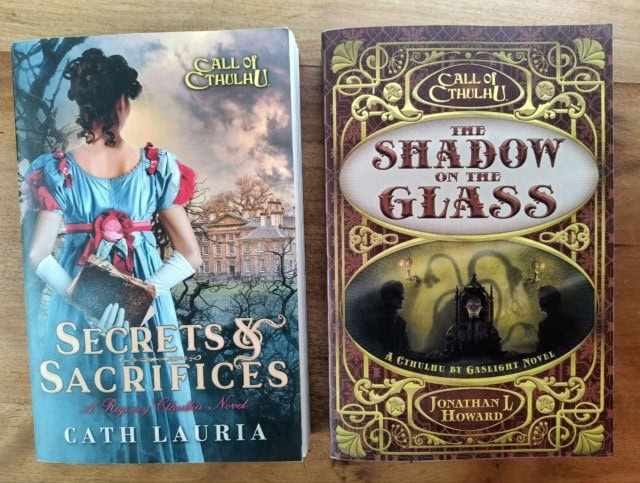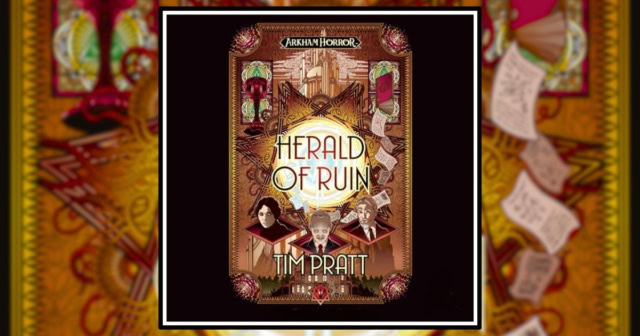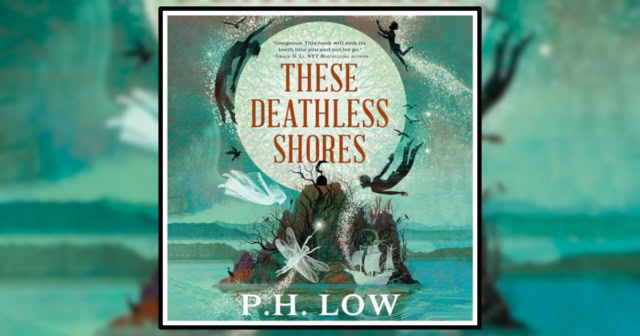Book Review: ‘The Shadow on the Glass’ by Jonathan L Howard (Call of Cthulhu series)

Lizzie and Bill have a pretty good thing going in Victorian London. Taking advantage of the spiritualist craze that’s sweeping society, Lizzie adopts the persona of Cerulia Trent, a medium that can connect people to their dearly departed loved ones. In a wise con, they never ask for money, but people are so grateful for their services that they shower them with cash in appreciation. Yeah, life is pretty good. Until the night they hold a session for Sir Donovan. Something goes horribly wrong, and they have to make a quick retreat. But now Lizzie isn’t Lizzie and if the entity that replaced her is right, the entire human race is in danger. Bill just wanted to make a quick buck, instead he has to find a way to save his best friend and the world in Jonathan L. Howard’s The Shadow on the Glass. So much for an easy con.
[Note: While I am reviewing this novel independently and honestly, it should be noted that it has been provided to me by Aconyte for the purpose of this review. Warning: My review of The Shadow on the Glass contains some spoilers!]
Aconyte’s new Call of Cthulhu book series
Aconyte specializes in book series based on popular games. The Call of Cthulhu is the newest series to follow this pattern. Two separate series are planned based on the Regency Cthulhu and Cthulhu by Gaslight game settings for Call of Cthulhu.
Based off H.P. Lovecraft’s tales of horror, Call of Cthulhu is set in Victorian England. Players choose characters that are ordinary people who get caught up in investigating secretive cults and the otherworldly monsters that they worship as gods. The players must find out what they can, and foil the cults’ devious plans before monstrous would-be gods can destroy the world.
The Shadow on the Glass follows this basic formula. Lizzie Whittle and William Grant are two run-of-the-mill con artists. They’re very good at what they do, so maybe they’re not exactly “run-of-the-mill”, but they are certainly mortal and mundane. Then they get thrust into the world of the extraordinary when they accept a job from Sir Donovan. Donovan claims to be looking to get in touch with the spirit of his dead wife and offers a ridiculous amount of money for the privilege, but what he’s really after is something much more sinister.
Lizzie is apprehensive about even going to the session. Something feels off to her, but Bill wants the money and convinces her to go. Things go sideways pretty quickly. Lizzie ends up passing out. Bill drags her out and escapes back to London.
When Lizzie finally wakes up it becomes apparent that she isn’t Lizzie any more. An alien entity has taken up residence in her body. The entity, which decides to go by Lizzie’s stage name of Cerulia Trent, promises that Lizzie is safe, but says that Lizzie won’t come back until the entity completes its mission. That’s all it takes for Grant to sign on to help the entity. Sure, he wants to save humanity, but getting Lizzie back is what really drives him. Together with the entity and a secret society dedicated to helping the entity, Grant goes to battle with Sir Donovan and the ancient evil that threatens to destroy the world.

The Shadow on the Glass is a fun Victorian Lovecraftian adventure
The Shadow on the Glass is an exciting adventure set in the perfect time period for its story. The late Victorian period is well known for its near obsession with the afterlife. Seances were all the rage and mediums were celebrated celebrities. This atmosphere is the perfect place to have interdimensional creatures trying to invade Earth.
People are messing around with all kinds of things they don’t understand, someone is bound to contact something they didn’t mean to contact (like Lizzie and Bill). And some of those people are bound to be the type that will happily sell out humanity for the promise of power or money (like Sir Donovan). This combination can make for some very messy situations.
The Shadow on the Glass chronicles one of these. But there are bound to be others, and in fact, the end of The Shadow on the Glass guarantees it. These stories should be both exciting and thought-provoking if future Call of Cthulhu follow in the footsteps of Howard’s tale.
The Call of Cthulhu series is perfect for fans of Aconyte’s Arkham Horror series. The two series are very similar, both deal with monsters inspired by H.P. Lovecraft and the humans who seek to help, control, or thwart those monsters. The biggest difference is the settings for these stories. Arkham Horror takes place mostly in Arkham, a little town in America in the roaring ‘20s. Meanwhile, Call of Cthulhu is set in Victorian London.
Now, of course, I’ve always been aware that these are different times with different flavors. But reading The Shadow on the Glass right after reading Herald of Ruin, an Arkham Horror tale, really highlighted the differences for me. Both stories are exciting and witty, with plenty of sass from the characters. But the sass felt different. Victorian sass still has a sophisticated edge to it. Meanwhile, 1920’s sass is sharper, with more bite.
Book Review: Herald of Ruin by Tim Pratt an Arkham Horror Novel
These differences are not specific to these books (i.e. it’s not just the writer’s voice or the series’ flavor). I have subconsciously cataloged these differences in all the different books I’ve read, I just never consciously acknowledged the differences in the feelings of these different time periods until I read these similar stories back-to-back. It was an interesting revelation for me.
Fans of Arkham Horror will like this new series
I have already mentioned how The Shadow on the Glass reminded me of Aconyte’s other horror series, Arkham Horror (my reviews of those books are here). Anyone who enjoys that series will find a new favorite in the Call of Cthulhu series. I highly recommend checking it out. Anyone with a fondness for the Victorian era will enjoy the series as well.
An interesting similarity between The Shadow on the Glass and the Arkham Horror series is the actual lack of monsters. Sure, there is a bad guy and the monsters do eventually make their appearance, but the real monsters are regular people. People who are willing to sell out the entire human race to scrape a little more power for themselves. The overall hubris and stupidity of these people is the same, too. I will never understand why people find these obviously evil and hugely powerful entities and assume that they will be able to control and/or trick them.
These creatures don’t think like humans, they don’t care about humans, and they will destroy you just like they’ll destroy everyone else. Evil is always bad, don’t trust it, just stay far away from it. But certain personalities can’t learn. Villains think that, of course, they will succeed where others failed because, of course, they’re just better. It’s sad, but it makes for some great stories, so as long as there are heroes to save the world, I won’t complain about those idiots too much.
Jonathan Howard’s The Shadow on the Glass is worth checking out
Overall, Howard has crafted an engaging story for the new series in The Shadow on the Glass. Fans of gothic horror are going to love his story. I loved seeing his simultaneously reluctant and wholehearted descent into the madness of a world beyond our own.
I can’t want to see Lizzie again for real. She wasn’t actually in The Shadow on the Glass for very long, but I really liked her and hope that she is featured more in future installments. But before you start thinking about future installments, you need to read this one. Pick up The Shadow on the Glass wherever you find Aconyte books this summer.
Rating: 9/10
The Shadow on the Glass by Jonathan L. Howard is now available most places books are sold. Have you read this series so far? Or the Arkham Horror series? Let us know what you think of these books on social media @mycosmiccircus!
Review: The Rise and Fall of The Galactic Empire by Dr. Chris Kempshall





